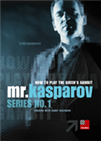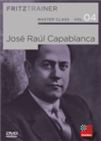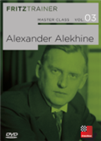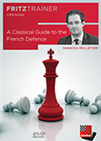Learning from the past
On this occasion, I would like to look back a bit in the history of chess and take a closer look at one of Carlsen's predecessors, Dr. Mikhail Botvinnik. 70 years ago, in 1948, he became World Champion, but already in the 1930s he belonged to the absolute world top. Let's examine how he did it and why he was so successful.
Mikhail Botvinnik was born on August, 17th, 1911 in the small village of Kuokkala, which is today part of Saint Petersburg. When he started playing chess, he was already 12 years old. Nevertheless, he made rapid progress and won two years later a nice game against the World Champion José Raúl Capablanca during a simultaneous exhibition in Leningrad, as St. Petersburg was then called.
Botvinnik's way to the top
 Garry Kasparov took to the Queen’s Gambit at a relatively late stage of his chess career, but then had the best training anyone could imagine: in his first match for the world championship against Anatoly Karpov, this opening appeared on the board no less than 19 times. Now he shares his knowledge with you.
Garry Kasparov took to the Queen’s Gambit at a relatively late stage of his chess career, but then had the best training anyone could imagine: in his first match for the world championship against Anatoly Karpov, this opening appeared on the board no less than 19 times. Now he shares his knowledge with you.In 1931, the only 20-year-old Botvinnik won for the first time the Soviet championship and repeated this success in 1933.

In Moscow 1935, Botvinnik won his first major international tournament. Among 20 participants, he shared first and second place with Salo Flohr with 13 points out of 19 followed by two former World Champions, Dr. Emanuel Lasker (12½) and José Raúl Capablanca (12). The Austrian grandmaster Rudolf Spielmann ended up fifth (11). Thus, the 23-year-old Botvinnik joined the narrow circle of top grandmasters of that time and became a potential World Championship candidate.
In Moscow 1936, Botvinnik finished second with 12 out of 18 behind Capablanca (13), but well ahead of Flohr (9½), Lilienthal (9), Ragozin (8½) and Lasker (8). The tournament had only half as many participants as in the previous year, namely ten, but two rounds had to be played.
In the tournament of Nottingham 1936, Mikhail Botvinnik came back to the top. He shared the first prize with Capablanca, the world champion from 1921–1927. Both made 10 points out of 14, closely followed by Dr. Max Euwe (the reigning world champion), Reuben Fine and Samuel Rehesvsky (9½ each). The tournament was incredibly strong. Among the 15 participants were two more former World Champions, Dr. Alexander Alekhine (he finished sixth with 9 points) and Dr. Emanuel Lasker (he and Salo Flohr shared seventh and eighth place with 8½ points each).
Photo (above): Botvinnik in 1936 Nationaal Archief, Den Haag, ANEFO [Public domain], via Wikimedia Commons
The Central Committee promotes the young chess talent
Immediately after the tournament, Botvinnik sent a telegram to the General Secretary of the Central Committee of the Communist Party of the Soviet Union, Joseph Stalin:
Dearly Loved Mentor and Leader ... I am immensely happy to announce that a representative of Soviet chess has shared first place in the tournament with former World Champion Capablanca. Fueled by your big call 'Get and overtake', I am glad that I managed to make it happen.
In his memoirs, Botvinnik wrote a lot about Nottingham 1936, but he did not mention this telegram. Of course, he had every reason to thank the party, for they actively promoted and supported aspiring chess talents. For his participation in Nottingham Botvinnik asked to be allowed to take his wife. This was not self-evident but was allowed because his results at the tournament in Moscow in 1936 had improved after his wife had come to the last three rounds.
Botvinnik: "Immediately I was given passports, tickets and money. It was quite a lot of money: travel money, about GBP £100, as for People's Commissars." (A)
Botvinnik on Capablanca
 He was a child prodigy and he is surrounded by legends. In his best times he was considered to be unbeatable and by many he was reckoned to be the greatest chess talent of all time: Jose Raul Capablanca, born 1888 in Havana.
He was a child prodigy and he is surrounded by legends. In his best times he was considered to be unbeatable and by many he was reckoned to be the greatest chess talent of all time: Jose Raul Capablanca, born 1888 in Havana. It is interesting in this context, what Botvinnik said about the 47-year-old Cuban former World Champion:
Capablanca was not as pretty then as he was in his youth; he had grown fatter, his sparse hair had turned a little grey. He was still charming. (...) Professionally, he did not engage in chess. His talent was as great as he was convinced of himself - at the chessboard he always knew the situation. It had been the same in adolescence as well, but with the inevitable weakening of the ability to evaluate the variations, Capablanca began to think of chess, not just during a game. During the tournaments, he looked closely at the opening systems and came up with new ideas." According to Botvinnik, Capablanca was "extremely dangerous, especially in the endgame.
The game between Capablanca (White) and Botvinnik took place on August 17th, 1936, Botvinnik's 25th birthday, and was not very eventful. One piece after the other was exchanged, and after only 29 moves, a perfectly balanced queen ending was on the board. Botvinnik wrote in his memoirs that he was a little surprised that Capablanca accepted his draw offer:
Maybe a young Capablanca would have started playing for a win, but the older one thought of accepting the proposal. Then the analysis of the game began, and Capablanca gave me a lesson in the queen endgame. How masterfully he centralised his queen and king without paying any attention to the loss of a pawn! But apparently I defended myself in a satisfactory manner, because Capablanca shook my hand after half an hour: 'Yes, a draw was inevitable!' (B)
"What a clever guy"
A pretty episode happened on the last day of the tournament. Let's hear what Botvinnik had to say about it:
Capablanca and I were in the lead with an equal number of points. I played against a weak participant, Winter, Capablanca against Bogolyubov. Some moves had been made, Capablanca took me aside and we walked around the hall. 'You have a good position and I have a good position,' he said. 'Let's both draw and share the first place.' Well, I thought, what a clever guy, Winter is not Bogoljubov. 'Of course, I'm ready to accept your proposal, but what will they say in Moscow?'.
So they kept on playing, but neither Botvinnik nor Capablanca won this last game. (C)

Capablanca 1930 | Photo: Unknown (Keystone-France) [Public domain], via Wikimedia Commons
The AVRO Tournament 1938
The organisers, the Dutch radio company AVRO, considered this event as a candidate tournament to determine the next challenger of World Champion Dr. Alexander Alekhine. In the previous year, he had dethroned the Dutch World Champion Dr. Max Euwe and thus regained his title. Botvinnik was a favourite for 1st place, but he made a silly mistake in his game with Euwe and ended up "only" third with 7½ out of 14 behind the two winners Paul Keres and Reuben Fine (8½ each). Alekhine, Euwe and Reshevsky shared 4th to 6th place (7 each), Capablanca was seventh (6) and Flohr eighth and last (4½).
In this tournament, Botvinnik won brilliantly against Capablanca and his successor, World Champion Dr. Alekhine. Both games can be found with detailed comments by Garry Kasparov in the "MegaBase":
The "Mega" is the database every serious chessplayer needs. The database contains 7.6 million games from 1500 to 2018, in highest quality standard, full of top level analyses and completely classified.
In 1941, 1944 and 1945 Botvinnik won the Soviet championship, and he also won in Groningen in 1946 with 14½ out of 19 ahead of former World Champion Max Euwe (14) and Vasily Smyslov (12½). A few months earlier, on March 24, 1946, World Champion Dr. Alexander Alekhine had died, and now Botvinnik was widely considered the one who would probably become his successor.
1948: Finally World Champion
 On this DVD GMs Rogozenco, Marin, Müller, and IM Reeh present outstanding games, stunning combinations and exemplary endgames by Alekhine. And they invite you to improve your knowledge with the help of video lectures, annotated games and interactive tests
On this DVD GMs Rogozenco, Marin, Müller, and IM Reeh present outstanding games, stunning combinations and exemplary endgames by Alekhine. And they invite you to improve your knowledge with the help of video lectures, annotated games and interactive testsIn 1948, while Stalin was still alive, Botvinnik finally decided to overtake and became the World Chess Champion. In a World Chess Championship tournament, organised for the first time by FIDE, five participants played five games against each other. The tournament took place from March, 2nd, 1948 to May, 16th, 1948. The first half was played in The Hague and the second in Moscow. Botvinnik won convincingly with 14 out of 20 ahead of Smyslov (11). Samuel Reshevsky and Paul Keres tied for 3rd and 4th place with 10½ each. Former World Champion Euwe ended up fifth and last with only 4 points.
Harold C. Schonberg wrote about Botvinnik's preparation in his book Grandmasters of Chess:
When he was preparing for a match, he went for a walk two hours a day — exactly to the minute. Then breathing exercises followed, and their duration was also exactly defined. Finally, a planned time span for theory and analysis had to be completed. Nothing was allowed to interrupt the schedule. His chess activity, his scientific work and his private life — everything was ordered and calculated. (D)
In addition to the detailed analysis of all games of his opponents and the preparation of variations and their testing in training games Botvinnik's preparation also included aspects which had not much to do with chess. Schonberg reports of a training match against Grandmaster Vyacheslav Ragozin for the purpose of arming himself against smoking opponents: "Ragozin's main task was to blow smoke into Botvinnik's face." (E) This measure is incomprehensible today, but at that time the chess players were allowed to smoke during their games, which could indeed become a problem for a convinced non-smoker. But back to the 1948 World Chess Championship...
Botvinnik or Reshevsky?
The five games between Botvinnik and the American grandmaster Reshevsky were especially hard-fought. Reshevsky, born in 1911 in Ozorkow, Poland, had made a name for himself at a young age as a chess wonder child. In 1920, his family emigrated to the United States, so Reshevsky represented the United States of America at the 1948 World Chess Championship.
When the participants had moved from The Hague to Moscow, where the second half of the tournament was to take place, the members of the Central Committee were worried that Reshevsky might win. Botvinnik was summoned to comment. Botvinnik began with the sentence: "Reshevsky can become World Champion" and described what happened next: "Everybody froze." But Botvinnik managed to dispel the concerns: "I explained that Reshevsky is a natural, a primal chess player, but limited in his understanding of chess — not universal enough; above all, he had an innate athletic flaw — he could not divide his time properly during a game, time trouble came into his game." (F)
Harold C. Schonberg characterised Reshevsky's playing style as follows, confirming Botvinnik's assessment:
He was the only former chess wonder child who did not tend to an open, classic style of play. Instead, he favoured nested, complicated positions. (...) Reshevsky fought for minimal positional advantages; if necessary, he tried to crush his opponent with sheer stamina even if the game dragged on for more than a hundred moves. (...) In another point, too, he was different from the other famous prodigies: he played infinitely slowly. (G)

Reshevsky at the 1948 World Championship | Photo: JD Noske, Nationaal Archief
Let's have a look at Reshevsky's dramatic fourth game against Botvinnik from round 19. In a French defence, Reshevsky (White), after just 20 moves, reached one of those "nested" positions with a blocked centre and interlocking pawn chains. The closed position allowed him to omit castling and launch a king's attack. However, after a premature manoeuvre, Botvinnik seized the initiative and could have easily won a second pawn. Instead, he also launched an attack, which he could complete excellently due to a mistake made by White. Botvinnik summarized the reasons for Rehevsky's defeat as follows:
In the early stages of the game Reshevsky played in a very subtle way, but in the choice of his opening — French defense — he made a mistake: I played this opening for more than twenty years. At the crucial moment, my partner made a mistake and the preponderance went to black. In time trouble Reshevsky worsened his position even more, and could not change it later in the game. (H)
At the end of the fourth round, Botvinnik had already collected enough points that Reshevsky could only catch up with him, but could not overtake him, and only if he had won all the remaining games and Botvinnik himself had lost all. The "danger" that an American could become world champion was averted.
Botvinnik had become World Champion deservedly. This is evident from the fact that he had won against all participants of the World Championship tournament: 1-0 with 4 draws against Smyslov, 4-1 against Keres, 2-0 with three draws against Euwe and 3: 1 with one draw against Reshevsky. What an amazingly low number of draws for a World Championship!
In this context, it should be mentioned that in 1948 yet another American had the chance to play for the world title, namely grandmaster Reuben Fine, who had won the AVRO tournament in 1938 with Keres. He had been invited to the World Championship tournament, but he had cancelled his participation. Let's wait and see if Fabiano Caruana will do better against Magnus Carlsen than Reshevsky did in 1948 against Botvinnik.
1968: Botvinnik wins brilliantly against Portisch
Botvinnik also worked as an electrical engineer and devoted himself to his doctoral thesis in this field for three years after winning the World Chess Championship in 1948. Despite the associated more or less long breaks, Botvinnik retained his title until 1963, apart from two one-year interruptions. He twice played 12:12 against David Bronstein (1951) and Vasily Smyslov (1954). In 1957 he was defeated by Smyslov and 1960 by the chess wizard Mikhail Tal, but in both cases, Botvinnik won back his title one year later. Only in 1963, he was finally replaced by the Armenian Tigran Petrosian as World Champion. Petrosian won 5:2 with 15 draws, and this time there was no rematch.
Similar to his idol Lasker, Botvinnik was able to maintain his playing strength for a very long time. The following game against the Hungarian grandmaster and multiple World Championship candidate Lajos Portisch proves that. It was played in Monte Carlo 1968:
The cancelled match with Bobby Fischer
 This DVD gives you the key to start out with the French Defence. GM Yannick Pelletier is a specialist of this opening, and believes that the most efficient way to understand its ideas, plans, and typical structures is to study classical lines.
This DVD gives you the key to start out with the French Defence. GM Yannick Pelletier is a specialist of this opening, and believes that the most efficient way to understand its ideas, plans, and typical structures is to study classical lines.In 1969 there were long negotiations for a match Botvinnik against Bobby Fischer. What a pity that this match did not come to pass! Botvinnik had suggested to play 16 games against the American, but Fischer insisted that the winner should be the one who scored six wins without limiting the total number of games. After all, Botvinnik would have agreed with 18 games, but Fischer refused again. Botvinnik wrote about this in his memoirs:
No matter how the match would have gone (Fischer would probably have won), the American could learn a lot from me (...) I told him that I'm not able to play more than eighteen games, and I suggested a compromise: we should play up to six won games, but if eighteen games were too few, the winner would be determined by point majority. Fischer did not accept that too. Now many realised that Fischer had a manic fear of starting the match." (I)
In fact, Botvinnik and Fischer played only one single tournament game against each other during the 1962 Chess Olympiad in Varna. After a dramatic fight and 68 moves, it ended in a draw.
The "Patriarch"
In 1970, Botvinnik ended his career as a professional chess player and devoted himself to the development of a chess program, a project he had already started in 1963. In addition, he successfully trained and promoted young chess talents. The World Champions Anatoly Karpov, Garry Kasparov and Vladimir Kramnik were students of his chess school. Botvinnik died on May 5th, 1995 in Moscow at the age of 83. He was respectfully called the "patriarch."
References
- (a) Michail Botvinnik, "Schacherinnerungen" (Düsseldorf 1981), S. 64 ff.
- (b) Michail Botvinnik, "Schacherinnerungen" (Düsseldorf 1981), S. 72-73
- (c) Michail Botvinnik, "Schacherinnerungen" (Düsseldorf 1981), S. 74
- (d) Harold C. Schonberg, "Die Großmeister des Schach" (Frankfurt/M. 1976), S. 222
- (e) Harold C. Schonberg, "Die Großmeister des Schach" (Frankfurt/M. 1976), S. 226
- (f) Michail Botvinnik, "Schacherinnerungen" (Düsseldorf 1981), S. 155-156
- (g) Harold C. Schonberg, "Die Großmeister des Schach" (Frankfurt/M. 1976), S. 206-207
- (h) Michail Botvinnik, "Schacherinnerungen" (Düsseldorf 1981), S. 157
- (i) Michail Botvinnik, "Schacherinnerungen" (Düsseldorf 1981), S. 255-256
























